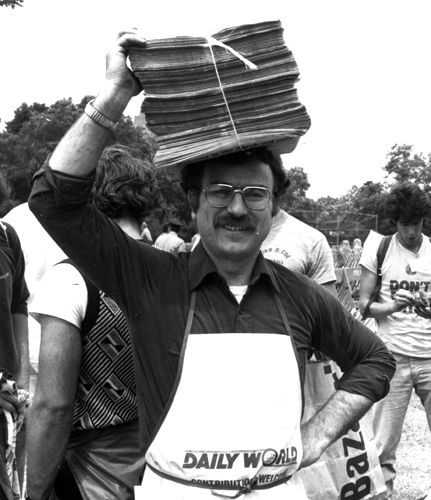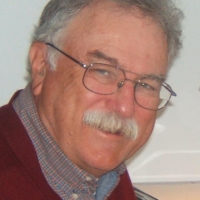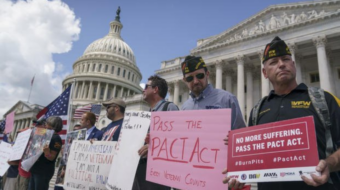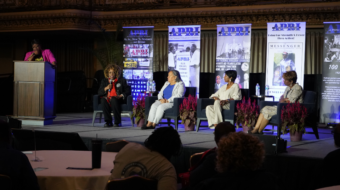
Another chapter in Tim Wheeler’s autobiography, to be published in 2016.
Alberta Friscia, a staff writer and photographer for the Daily World snapped a photo of me long ago striking a jaunty pose with a bundle of Daily Worlds balanced on top of my head.
She must have taken the photo at a big peace or labor rally because I am wearing a Daily World apron. That suggests I was not armed with a notepad and ballpoint pen covering the event but rather joining with the DW team in distributing the paper to the crowd.
The photo brought back happy recollections of my adventures handing out many thousands of our paper at plant gates such as the Bethlehem Steel Sparrows Point mill, or door-to-door in East Baltimore, or at huge demonstrations on the Capitol Mall in Washington D.C. Those newspapers often carried headline articles I had written. As I handed the paper to a peace marcher, I would say: “Check out that front page article. I wrote it.”
I admit, vanity was a factor in my enthusiasm for distributing the paper.
At these events, I joined teams of 20 or 30 or even 100 comrades who fanned out with bundles of papers saturating the crowd with our paper.
“I believe in freedom of the press and I plan to stay.”
Yet on other occasions, I was the lone distributor. Sometime in the mid-1970s, the AFL-CIO Building and Construction Trades Department met at a hotel in Washington D.C. I was assigned to cover it and had my AFL-CIO credential dangling from my neck. But the DW also sent down bundles of the paper to be distributed to the 1,000 or more delegates, and the distribution task fell to me.
I went to the Greyhound Depot early one morning and picked up the bundles, drove to the Sheraton Hotel. I parked the car and lugged the bundles into the hotel. I found a corridor with a heavy flow of union delegates and started handing them out as fast as I could move my hand. The delegates were grabbing them, their faces buried in the front page reading as they hurried off to a plenary session.
Of course, I had to cover that session so I was in a hurry to hand the paper out but also delighted by the eagerness of these trade unionists in accepting the paper.
Then out of nowhere, a very large Sergeant-at-Arms appeared. “What are you doing?” he snapped.
“I’m distributing the Daily World.”
“Who authorized this?”
“No one. I didn’t know I needed authorization.”
“Well, you do. Leave immediately or I’ll have you arrested.”
“I believe in freedom of the press and I plan to stay.”
“I’m going for backup. If you are still here when I return, you will be arrested.”
He rushed off down the corridor. I was in a terrible sweat. Not only would I be left with papers undistributed, I would lose my credential and not be able to cover the afternoon session when Sen. Ted Kennedy was scheduled to deliver one of his stemwinders.
Yet, as the sweat trickled from my brow, I was still handing out the paper as quickly as I could. I worked for just a couple of minutes longer and then looked down the hall and saw the Sergeant-at-Arms looming in the distance with two other beefy enforcers bearing down on me. I bent, picked up the bundle of papers, preparing to turn and run.
Then suddenly a cheery voice rang out. “Tim! Tim Wheeler. It’s so good to see you!”
I turned, and who should I see hurrying down the hall from the opposite direction but Lou Weinstock, a revered leader of the Painters Union and also a member of the National Committee of the Communist Party USA. Lou was bubbling with as much enthusiasm as he was that day in the 1930s when he leaped from a balcony onto a chandelier in the ballroom of a Cincinnati hotel during a convention of the AFL. He shouted at the delegates that long ago day to “Stop Starvation NOW” by joining the struggle to win Unemployment Compensation.
“Tim, I’m so glad you are here,” Lou exclaimed. “I want you to meet my friend. He’s the International President of the Painters Union.” And sure enough, there right beside him was S. Frank “Bud” Raftery, President of the International Union of Painters & Allied Trades. Raftery was a staunch progressive beloved by union painters and other building trades workers everywhere. He was a close friend of Lou Weinstock.
Raftery shook my hand warmly. Lou took two copies of the DW from me and handed one of them to Raftery. “Here Bud, here’s something for you to read during the next coffee break.”
I glanced over my shoulder in time to see the Sergeant-at-Arms come to a screeching halt. He and his fellow security agents, looking like NFL lineman, beat a hasty retreat back up the corridor.
As Lou and Raftery strolled off down the hall, I completed the distribution of the paper. I still had ample time to get back to the ballroom in time to hear Kennedy rip the greedy corporate elite.
At the Black Power Summit in New Orleans
Not all these adventures took place in Washington, D.C. In the late 1980s, I was sent down to New Orleans to cover a national “Black Power Summit” at one of the largest convention hotels. About 2,000 delegates from all over the U.S. came to this gathering. It included 12 leaders of the CPUSA led by Jim Jackson and Charlene Mitchell. The Party contingent met in a hotel room to strategize. At the end of the meeting, the question of distributing the 800 copies of the DW that had been sent down on the Greyhound bus was discussed. We went around the room and everyone had an assignment that made it impossible for them to help distribute the paper. Again, it fell to me.
We must have had a rental car. I can’t remember. Somehow, I drove to the Greyhound Depot, picked up the eight bundles of papers and returned to the hotel. I unloaded them on the sidewalk right in front of the hotel and went to park the car. When I got back, I opened a bundle and started to hand them out.
Inside, a plenary session was coming to an end. It was evening and the delegates were headed to Louis Armstrong Park for a night of jazz and celebration. They began to stream out and I was handing the paper to them as fast as I could move my hand.
The hotel doorman, a tall, powerfully built African-American man dressed in pearl gray livery with a top hat caught sight of me and approached. “What are you doing, sir?” he demanded. Again, I quelled the urge to drop the papers, turn and run.
“Well,” I said. “I’m trying to distribute this paper.”
He glanced down at the bundles of DWs behind me. “You’s got a whole lot of papers to distribute by yourself. Let me give you a hand.”
With that, he stooped, picked up a bundle of papers and began handing them to the delegates as they boarded the chartered buses. Soon, his hands were moving as fast as mine.
Somehow, we managed to distribute every copy of the paper. I stepped over to where he was standing and shook his hand. “It went well,” he told me. “The delegates were happy to receive your paper.” He flashed a genial smile. “I better go in and wash my hands. They’re covered with ink.”
There is a reason New Orleans is nicknamed “The Big Easy.” It’s not just the Mississippi that flows by the town. I will not soon forget that hotel doorman who came to my rescue that day.
I could go on about the joy I got over the years in handing out a movement paper bringing news the people rarely get in the commercial for-profit media, “News for the 99%.” In 1986, when we joined up with the Great Peace March for Nuclear Disarmament in Indiana – it was a cross-country event — we wrote about the progress of the march heading for Washington D.C. We filed a story every day. The office in New York printed it and bundles were shipped back to distribute to the marchers. I joined the march in Youngstown and marched to Pittsburgh writing a story every day and helping local comrades distribute the bundle when it was delivered. In Pittsburgh, someone else took my place, as I recall, Marilyn Bechtel.
“We Are Union in This Valley.”
When the Pittston Coal Miners went on strike, our correspondents covered it. Denise Winebrenner and Scott Marshall were invited by the miners to join in their courageous occupation of a Pittston Mine Portal in Southwest Virginia reminiscent of the Flint Sitdown in the 1930s. Again, we shipped bundles down and distributed them to the coal miners.
In 1996, the United Steelworkers went on strike against Wheeling-Pitt. The strike would last over a year, the longest work stoppage in steel industry history. Again my paper, by now named the People’s Weekly World (PWW), covered that strike extensively and in depth. I was the editor of the PWW and traveled to Youngstown and to Follansbee, W.Va. to cover the strike—and also to distribute the PWW.
When a comrade, a Pittsburgh woman schoolteacher, and I arrived in Follansbee, the town, a majority Italian-American, were preparing to celebrate Garibaldi Day. The highlight was a parade and already thousands of citizens had set up folding chairs along main street and were sitting waiting for the parade to begin.
I dropped the comrade at the far end of the street with a couple of bundles of the PWW. Then I drove to the other end. We worked our way toward each other passing out the paper to every resident waiting for the parade to begin.
When we finished, we looked back up main street. Virtually everyone in town was reading the paper!
I even remember the banner headline that blazed from that edition over the front page article written by Denise Winebrenner: “We Are Union in This Valley.” It is the best headline I have ever seen on any newspaper.
In my half century as a staff writer and editor, we probably distributed well over a million copies of our 20 page paper. Some of those who accepted the paper paid the 50 cent cover price. I remember Frank Soifer. Frank, who joked that he was chosen for his august position as chairperson of the Communist Party of Oregon “by a process of elimination” raised over $1,000 annually by selling the paper to the residents of Eugene where he lived. Frank’s tactic when he handed the paper to a passersby was to say, “free…donations accepted.” Hundreds of people would give him a dollar and say, “Keep the change.”
Fundraising!
Yet these donations did not begin to cover the cost of the hundreds of thousands of papers we distributed. How did we cover those costs? Fundraising! Every year we raised $200,000 or more to keep the paper afloat. We organized banquets, potluck suppers, flea markets, garage sales, bake sales, and mass meetings featuring guest speakers. We celebrated when these events brought in anywhere from $500 to $5,000.
Once I gained a reputation as an enjoyable speaker to listen to, I was sent out on speaking tours to help raise money to sustain the paper. In 1991, I spoke in 24 cities and towns, at events that brought in more than $40,000. After speaking at a kickoff rally in New York City, I spoke at Cleveland State University. But when I returned to Rick Nagin’s home after that speech, I could not find my airline ticket. Rick and I were on the phone to officials at Cleveland State. I even think Rick drove back to the campus and searched the auditorium where I spoke. I had been scheduled to return home to Baltimore before resuming the tour. I paid for a ticket to fly home, eaten up with anxiety over the missing ticket. I was getting ready to buy a replacement when the phone rang. A janitor had found my ticket under the seats in the front row of the auditorium where I had been sitting before I spoke. It had been in the inside pocket of the sport coat I was wearing and somehow fell on the floor. It would have cost me a couple thousand dollars to replace that ticket. Someone in the central office of Cleveland State overnighted it to me. It arrived just in time. The rest of the tour was, in my personal opinion, a triumph!
The People’s World, today, is environmentally friendly and no longer publishes on newsprint. And we know that this online publication is read by hundreds of thousands of readers on their laptops or desk computers or at the local library. The cyber revolution has opened the way for us to reach millions.
Yet I draw some lessons from my years of distributing our paper, feeling the personal warmth of meeting people face-to-face to talk with them about the most burning issues of the day. We no longer need to haul those bundles to the next demonstration or strike picketline. We no longer struggle every year to raise the money to pay for them.
But we still need to get out and talk to people face-to-face, to convince them that we all need to join the movement to defend democracy and fight for the progressive change we all know is necessary. And yes, we also need to do lots of fundraising to pay for it. News for the 99% is not free!
Photo: People’s World










